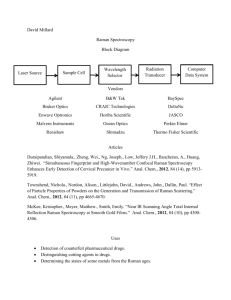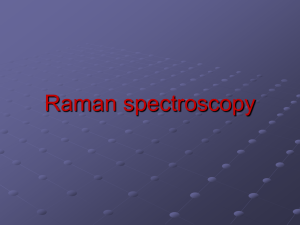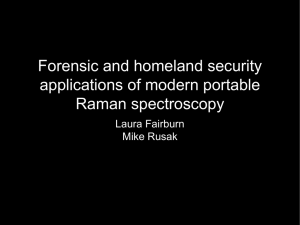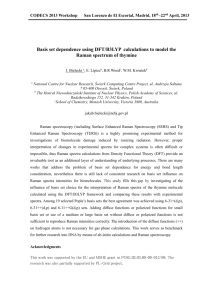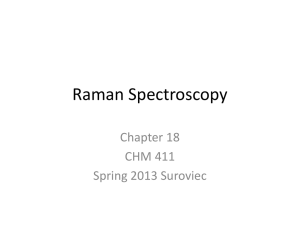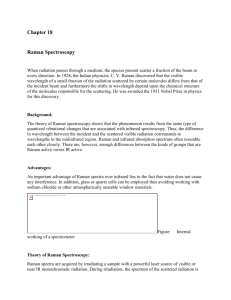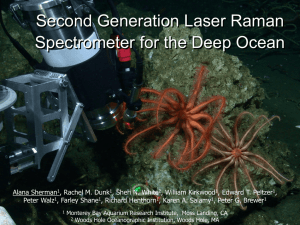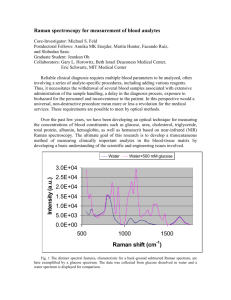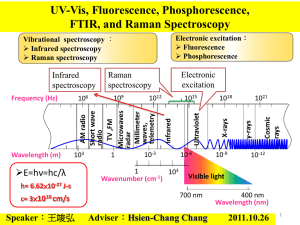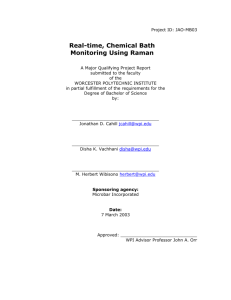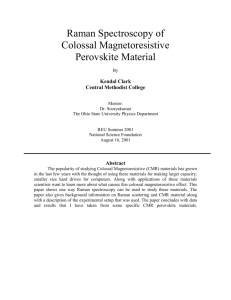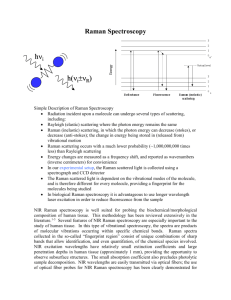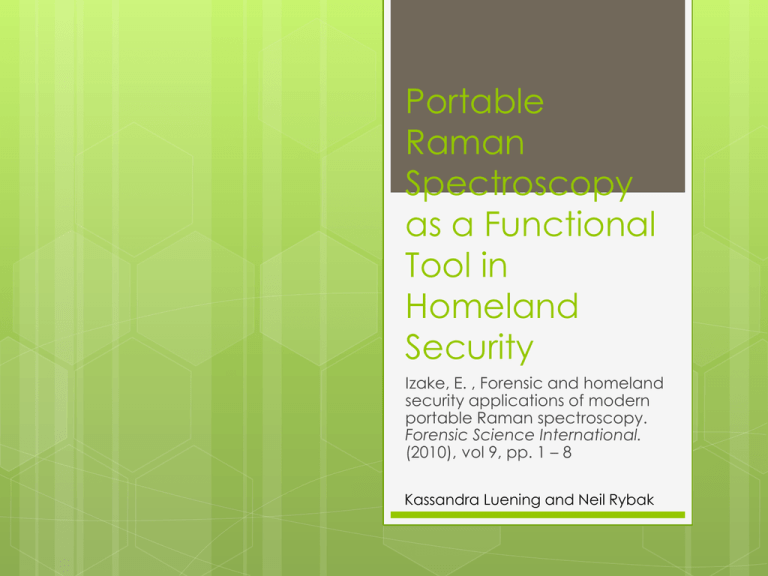
Portable
Raman
Spectroscopy
as a Functional
Tool in
Homeland
Security
Izake, E. , Forensic and homeland
security applications of modern
portable Raman spectroscopy.
Forensic Science International.
(2010), vol 9, pp. 1 – 8
Kassandra Luening and Neil Rybak
Conventional Techniques
GC/MS
HPLC/MS
THZ (Terahertz radiation spectroscopy)
Limitations
Operator must come into contact with potentially
hazardous samples
Instruments must be disposed of or decontaminated after
contact with hazardous materials
These techniques are not portable. Require the movement
of complex instruments
Portable Raman Instruments
Allows for the portability
of Raman spectroscopy
High volumes of samples
can be scanned, without
the operator coming into
contact with the sample,
and the units are now
fully portable
Chemistry of Raman Spectroscopy
Monochromatic
light applied to sample
Incident light is scattered
Rayleigh (elastic) and Raman (inelastic)
Rayleigh
scatter is filtered out
The returned scattered light is a different
wavelength
This difference corresponds to an energy
shift which provides a unique chemical
fingerprint
Advantages of Raman Spectroscopy
Provides molecular fingerprints of each analyte,
providing the possibility of highly selective
determinations
Applicable to any optically accessible sample; organic,
inorganic, or biological
Solid, liquid, gaseous, transparent and non-transparent
samples can be measured
Aqueous solutions present no special technical
problems
Sample scanning is non-invasive
Detection can be of sample sizes from 1 µm – dm2 and
distances from millimetres up to several metres
Raman fingerprint is independent of excitation
wavelength, allowing for the use of any laser for
excitation
Detection can be done day and night without the
presence of background signals due to ambient light
interference
Raman spectroscopy has become fully portable
Examples of Portable Raman in Use
Has
been used to identify illicit drugs using
NIR laser excitation2
Capable of rapid detection, acquisition
times of 1 minutes when analyzing
amphetamine street samples3
Ultra trace amounts of illicit drugs (5 – 20
µm in size) found under nail varnish in a
non-destructive manner in under three
minutes4
Stand-off Raman detection of hazardous
substances
Constructing a gated
detector system can
restrict the laser pulse of
the light source
Data collected at the
time the laser is
expected to arrival at
the sample
Allows for sample
detection from
distances up to 100
metres5
Ahura First Defender
Currently in use by
emergency response
teams6
Has been used to assist the
FBI to identify hazardous
materials7
Results of the analysis of
the “First Defender”
instrument have been used
in court to assist in a
conviction9
Ahura TruNarc
The
ease of use of the instrument and the
library of samples “potentially eliminates
the need for a chemist to testify”
Simple non-expert use of the instrument
Rigaku Firstguard Handeld Analyzer8
No sample prep
needed
Operated like a point
and shoot camera
Delivers results in
seconds with no
chance of human error
User can either build
their own database or
use supplied library
Conclusions
Portable Raman has been shown to be more
effective than conventional methods in the
detection of drugs and other hazardous
samples
No contact of sample with analyst or instrument
High throughput capability
Can be used in close proximity of sample or at
distances
Can analyze organic, inorganic and biological
samples through containers, in both light and
dark environments
New portable instrumentation is user friendly
allowing non expert users to easily identify
samples
References
1.
2.
3.
4.
5.
6.
7.
8.
9.
Izake, E. , Forensic and homeland security applications of modern portable
Raman spectroscopy. Forensic Science International. (2010), vol 9, pp. 1 – 8
S.E.J. Bell, D.T. Burns, A.C. Dennnis, L.J. Matchett, J.S. Speers, Composition and
profiling of seized ecstasy tablets by Raman spectroscopy, Analyst 125 (10) (2000)
541 – 544
E. Katainen, M. Elomaa, M. Laakkonen, E. Sippola, P. Niemela, K. Janne Suhonen,
Jarvinen, Quantification of the amphetamine content in seized street samples by
Raman Spectroscopy, J. Forensic Sci. 52 (1) (2007) 88 – 90
E. Ali, H. Edwards, M. Hargreaves, I. Scowen, Raman spectroscopic investigation
of cocaine hydrochloride on human nail in a forensic context, Anal. Bioanal.
Chem. 390 (4) (2008) 1159 – 1166
S.K. Sharma, New trends in telescopic remote Raman spectroscopic
instrumentation, Spectrochim. Acta Part A 68 (5) (2007) 1008 – 1022
City of Albany, NY. Department of Fire, Emergency Services and Code
Enforcement Accomplishments for 2009.
Monmouth County Health Department Hazardous Materials Response/UST Units
2009 Annual Report
Information obtained from brochure provided by contact with Rigaku Raman
Technologies (www.rigakuraman.com)
Rains, S. (2011, May 7), Convict Guilty of Courthouse Hoax. Lawton Constitution
(http://www.swoknews.com/main.asp?SectionID=11&SubSectionID=98&ArticleID=
34618)
Ahura TruScan in use

